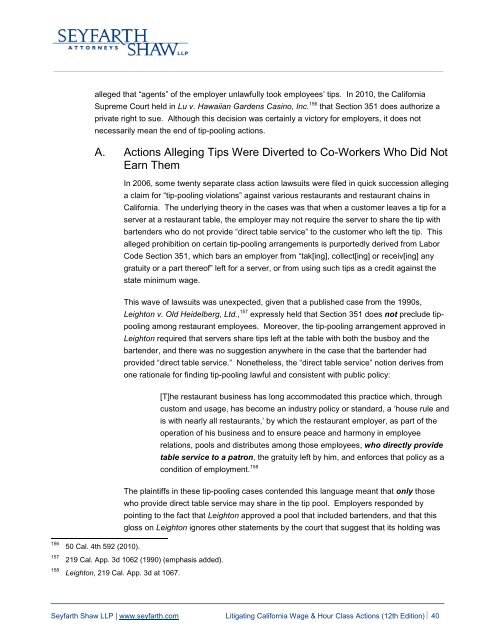Litigating California Wage & Hour and Labor Code Class Actions
Litigating California Wage & Hour and Labor Code Class Actions
Litigating California Wage & Hour and Labor Code Class Actions
You also want an ePaper? Increase the reach of your titles
YUMPU automatically turns print PDFs into web optimized ePapers that Google loves.
alleged that “agents” of the employer unlawfully took employees’ tips. In 2010, the <strong>California</strong><br />
Supreme Court held in Lu v. Hawaiian Gardens Casino, Inc. 156 that Section 351 does authorize a<br />
private right to sue. Although this decision was certainly a victory for employers, it does not<br />
necessarily mean the end of tip-pooling actions.<br />
A. <strong>Actions</strong> Alleging Tips Were Diverted to Co-Workers Who Did Not<br />
Earn Them<br />
In 2006, some twenty separate class action lawsuits were filed in quick succession alleging<br />
a claim for “tip-pooling violations” against various restaurants <strong>and</strong> restaurant chains in<br />
<strong>California</strong>. The underlying theory in the cases was that when a customer leaves a tip for a<br />
server at a restaurant table, the employer may not require the server to share the tip with<br />
bartenders who do not provide “direct table service” to the customer who left the tip. This<br />
alleged prohibition on certain tip-pooling arrangements is purportedly derived from <strong>Labor</strong><br />
<strong>Code</strong> Section 351, which bars an employer from “tak[ing], collect[ing] or receiv[ing] any<br />
gratuity or a part thereof” left for a server, or from using such tips as a credit against the<br />
state minimum wage.<br />
This wave of lawsuits was unexpected, given that a published case from the 1990s,<br />
Leighton v. Old Heidelberg, Ltd., 157 expressly held that Section 351 does not preclude tippooling<br />
among restaurant employees. Moreover, the tip-pooling arrangement approved in<br />
Leighton required that servers share tips left at the table with both the busboy <strong>and</strong> the<br />
bartender, <strong>and</strong> there was no suggestion anywhere in the case that the bartender had<br />
provided “direct table service.” Nonetheless, the “direct table service” notion derives from<br />
one rationale for finding tip-pooling lawful <strong>and</strong> consistent with public policy:<br />
[T]he restaurant business has long accommodated this practice which, through<br />
custom <strong>and</strong> usage, has become an industry policy or st<strong>and</strong>ard, a ‘house rule <strong>and</strong><br />
is with nearly all restaurants,’ by which the restaurant employer, as part of the<br />
operation of his business <strong>and</strong> to ensure peace <strong>and</strong> harmony in employee<br />
relations, pools <strong>and</strong> distributes among those employees, who directly provide<br />
table service to a patron, the gratuity left by him, <strong>and</strong> enforces that policy as a<br />
condition of employment. 158<br />
The plaintiffs in these tip-pooling cases contended this language meant that only those<br />
who provide direct table service may share in the tip pool. Employers responded by<br />
pointing to the fact that Leighton approved a pool that included bartenders, <strong>and</strong> that this<br />
gloss on Leighton ignores other statements by the court that suggest that its holding was<br />
156<br />
157<br />
158<br />
50 Cal. 4th 592 (2010).<br />
219 Cal. App. 3d 1062 (1990) (emphasis added).<br />
Leighton, 219 Cal. App. 3d at 1067.<br />
Seyfarth Shaw LLP | www.seyfarth.com <strong>Litigating</strong> <strong>California</strong> <strong>Wage</strong> & <strong>Hour</strong> <strong>Class</strong> <strong>Actions</strong> (12th Edition) 40
















